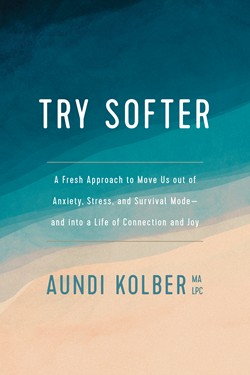Just as there’s no way to rush a flower to bloom, we cannot be where we aren’t—we have to go at the pace that feels doable to us. Respect the intensity of your experience and remember that the in-between is sacred too. If I’ve learned anything, it may be that the way we do something matters as much as what we do. The process of blooming is as valuable as the flower it produces.
by Aundi Kolber, author of Try Softer: A Fresh Approach to Move Us out of Anxiety, Stress, and Survival Mode—and into a Life of Connection and Joy
Personal growth is a journey, not an event. It’s a becoming. As author Brené Brown writes, “Owning our story and loving ourselves through that process is the bravest thing that we will ever do.”
Unfortunately, many of us have been taught—either consciously or unconsciously—that our stories and our experiences don’t matter. Perhaps if we simply “buck up,” our problems will magically resolve. Or possibly we just need to forget what happened and “let it go.”

That is the approach Erica, a mother of two and part-time account manager in a marketing firm, tried to take. She is smart, capable, and kind. She appears to have it all together, so people are always asking for her help. In turn, she attempts to offer more than she has to give. Growing up, Erica learned that she didn’t have much of a choice. The message she received from demanding parents was that no matter how bad she felt on the inside, it was essential to uphold the image of a successful family. This cemented her belief that she had to appear okay even if she wasn’t. Throughout her childhood and adolescence, Erica constantly battled shame, feeling that she was just too sensitive and too much because she couldn’t keep her emotions from bubbling up.
Now as an adult, Erica finds herself constantly ignoring signs of hunger, stress, sadness, or the terrible pain in her neck and back—pushing down discomfort because she’s promised herself she won’t be too much anymore. At the office, she’s productive, but she feels as if she is always one moment away from breaking. What if she forgets to reply to that important e-mail? What if her work doesn’t meet expectations? What if . . . ?

Erica runs on constant anxiety and adrenaline at work, and when she comes home, she is fried and emotionally overwhelmed. She is often trying new techniques to help her better manage her life, but they never stick. When she takes a rare moment to reflect at the end of the day, she recognizes that she’s her own worst critic—which probably isn’t healthy—but who has the time or energy to be kind to themselves?
From a psychological and physiological perspective, the more disconnected we are from our lived experience, the more overwhelmed or numb to our lives we’ll be. Research has shown us, in fact, that having cohesive stories matters for our emotional wellness.
As a trauma-informed therapist, I don’t consider stories to simply be abstract concepts or ethereal ideas, but instead the neurobiological framework through which we experience life—for better or worse. Simply put, stories—or the compilation of events, emotions, sensations, ideas, and relationships we’ve experienced—are held in our minds and bodies, and they affect how we see our world. The templates some of us live from confirm that we are relatively safe and loved, and though we are imperfect, we are still capable. Others among us have been hardwired through our experiences to believe that we are not enough or that we’re shameful, unlovable, or any number of other untruths.

The stories we weave and the meaning we make from them create templates for how we understand God, life, others, and ourselves. Regardless of the frameworks we carry, choosing to care for and nurture the whole history of who we are is connected to the way we were made to thrive.
What does it look like if we’re disconnected from our stories—and why would we want to disconnect in the first place? Typically, it’s because some parts of them feel disturbing, or at least uncomfortable. As a result, we may want to minimize or numb the pain we’ve been through, the significance of our wounds, or the intensity of our discomfort. But denying the reality of our experiences doesn’t make us more into who God designed us to be, but less. There’s no way to have cohesive stories unless we truly embrace all of it: the good, the hard, the bittersweet, the sad, the joyful, the lonely, and the painful. It all counts.
Learning how to be “with” our stories—in our bodies, without becoming overwhelmed by or numbing our past experiences—is the way we will learn how to actually handle and move through the grief and anxiety that come up. It’s also the way we will learn to write new endings that are true to ourselves.

So what does owning all of your story look like? For Erica, learning to tell her story means she has to honestly acknowledge where she is avoiding or minimizing pain. It also means that when something feels too overwhelming for her to consider in a particular moment, she or her therapist take a break from exploring that part further until she feels ready to address it more fully. Over time, Erica can develop the ability to embrace all parts of her story.
Just as there’s no way to rush a flower to bloom, we cannot be where we aren’t—we have to go at the pace that feels doable to us. Respect the intensity of your experience and remember that the in-between is sacred too. If I’ve learned anything, it may be that the way we do something matters as much as what we do. The process of blooming is as valuable as the flower it produces.
Parts of your story may bring up pain—there’s no shame in that. It’s simply a sign that it may be good to pause or slow your pace when you delve into difficult pieces. Give yourself permission to fully shift out of your story for a bit. For example, pop a mint in your mouth and notice the flavors or the tingling on your tongue. Turn on your favorite song and sing along at the top of your lungs. Or arrange to meet a friend or two for coffee and let yourself receive their warmth.

The truth is that for many of us, embracing our stories is the work of a lifetime. This idea of honoring our lived history is more about an internal posture that keeps us open and curious to the nuances than it is about completing a task.
The goal isn’t to bring about a quick fix, but to empower us with the freedom to live in the here and now while still honoring and tending to the wounds of our stories that have kept us disconnected from our experiences. That’s what Trying Softer is all about.
 Try Softer: A Fresh Approach to Move Us out of Anxiety, Stress, and Survival Mode—and into a Life of Connection and Joy by Aundi Kolber
Try Softer: A Fresh Approach to Move Us out of Anxiety, Stress, and Survival Mode—and into a Life of Connection and Joy by Aundi Kolber
In the wise and soulful tradition of teachers like Shauna Niequist and Brene Brown, therapist Aundi Kolber debuts with Try Softer, helping us align our mind, body, and soul to live the life God created for us.
In a world that preaches a “try harder” gospel—just keep going, keep hustling, keep pretending we’re all fine—we’re left exhausted, overwhelmed, and so numb to our lives. If we’re honest, we’ve been overfunctioning for so long, we can’t even imagine another way. How else will things get done? How else will we survive?
It doesn’t have to be this way.
Aundi Kolber believes that we don’t have to white-knuckle our way through life. In her debut book, Try Softer, she’ll show us how God specifically designed our bodies and minds to work together to process our stories and work through obstacles. Through the latest psychology, practical clinical exercises, and her own personal story, Aundi equips and empowers us to connect us to our truest self and truly live. This is the “try softer” life.
In Try Softer, you’ll learn how to:
- Know and set emotional and relational boundaries
- Make sense of the difficult experiences you’ve had
- Identify your attachment style—and how that affects your relationships today
- Move through emotions rather than get stuck by them
- Grow in self-compassion and talk back to your inner critic
Trying softer is sacred work. And while it won’t be perfect or easy, it will be worth it. Because this is what we were made for: a living, breathing, moving, feeling, connected, beautifully incarnational life.





1 Comments
Learning to live a better life in this stressful world, loving yourself, learning to deal with your weaknesses and turn them into a strength, learning to make relationships good and boundaries. Changes is hard work but if it helps you live a better life, it will be well worth it.